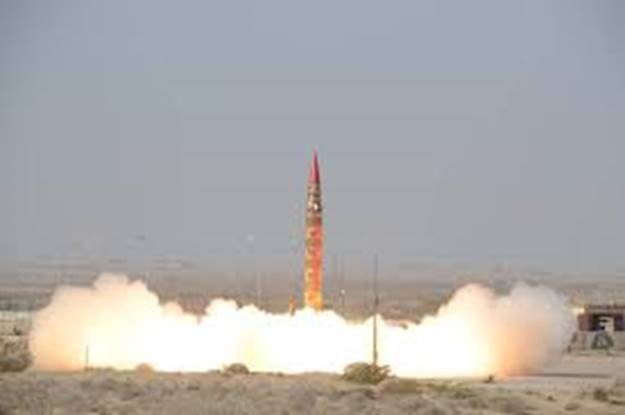

US Missile Sanctions: Are Pakistanis Really Developing ICBMs?
By Riaz Haq
CA

The outgoing Biden Administration has announced new sanctions against Pakistani entities working on the nation's missile program. The latest round of sanctions includes the Islamabad-based National Development Complex (NDC) and three Karachi-based organizations: Akhtar and Sons Private Limited, Affiliates International and Rockside Enterprise.
Explaining the decision, US Deputy National Security Advisor Jon Finer accused Islamabad of having developed "increasingly sophisticated missile technology, from long-range ballistic missile systems to equipment that would enable the testing of significantly larger rocket motors.”
“Candidly, it’s hard for us to see Pakistan’s actions as anything other than an emerging threat to the United States,” Finer added, as reported by Reuters news agency .
"They don't acknowledge our concerns. They tell us we are biased," said the second US official, adding that Pakistani officials have wrongly implied that US sanctions on their missile program are intended "to handicap their ability to defend against India."
Finer said senior US officials, including himself, have raised concerns about the missile program with top Pakistani officials. Washington and Islamabad, he noted, had been "long-time partners" on development, counterterrorism, and security. "That makes us question even more why Pakistan will be motivated to develop a capability that could be used against us. If those trends continue, Finer said, "Pakistan will have the capability to strike targets well beyond South Asia, including in the United States."
The number of nuclear-armed states with missiles that can reach the US homeland "is very small and they tend to be adversarial," he continued, naming Russia, North Korea, and China, according to Reuters.
"So, candidly, it's hard for us to see Pakistan's actions as anything other than an emerging threat to the United States," Finer said.
His speech came a day after Washington announced a new round of sanctions related to Pakistan's ballistic missile development program, including for the first time against the state-run defense agency that oversees the program.
Pakistan has denounced the new US sanctions on the country’s ballistic missile program as “discriminatory” and accused the Biden administration of putting the region’s peace and security at risk. Pakistan’s Ministry of Foreign Affairs on Thursday warned in a statement that the sanctions “have dangerous implications for strategic stability of our region and beyond”.
US State Department spokesman Matthew Miller said on X that the US had “been clear and consistent about our concerns” over such weapons proliferation and that it would “continue to engage constructively with Pakistan on these issues.” Pakistani officials have cast doubt on US allegations that the targeted businesses were involved in weapons proliferation because previous sanctions “were based on mere doubts and suspicion without any evidence whatsoever”, according to media reports . The sanctions are also opposed by Pakistan Tehreek-e-Insaf (PTI), the party of Pakistan’s imprisoned former Prime Minister Imran Khan.
A.K. Chishti, a Pakistani analyst, believes that the US sanctions are aimed at disrupting Pakistan's efforts to build a second-strike capability. "The US sanctions against Pakistani firms, particularly those tied to Pakistan’s National Development Complex (NDC) and other defense contractors, appear to be a calculated attempt to slow down Pakistan's nuclear missile advancements", says Chishti. "These companies are central to Pakistan’s missile program, including efforts to develop submarine-launched nuclear platforms, which are critical to second-strike capability", he wrote in an article in The Wire Pakistan .
My own view is that Pakistan is developing heavier rocket engines for satellite launch capability to compete with India in space. Space is becoming increasingly important for national security and Pakistan has a lot of catching up to do to remain relevant.
It also appears that the events of the past year in the Middle East have reinforced the view among many developing countries, including Pakistan, that the only law that matters in today's world is the "law of the jungle" in which "Might is Right". This is causing them to take their national security much more seriously than in the past.
Will the US pressure on Pakistan work? The following two quotes answer this question:
1. "The Pakistani establishment, as we saw in 1998 with the nuclear test, does not view assistance -- even sizable assistance to their own entities -- as a trade-off for national security vis-a-vis India". - US Ambassador Anne Patterson, September 23, 2009
2. “Pakistan knows it can outstare the West." - Pakistani nuclear scientist Pervez Hoodbhoy, May 15, 2011
Rabia Akhtar, a visiting scholar at Harvard Kennedy School’s Managing the Atom project, believes that targeting specific entities within Pakistan’s missile development framework ignores its indigenous capabilities. She says that this self-sustained program operates independently of external influences and is not easily swayed by coercive tactics. She also contends that such measures fail to address broader regional security dynamics while neglecting the provocations that drive Pakistan’s deterrence posture.
(Riaz Haq is a Silicon Valley-based Pakistani-American analyst and writer. He blogs at www.riazhaq.com )

